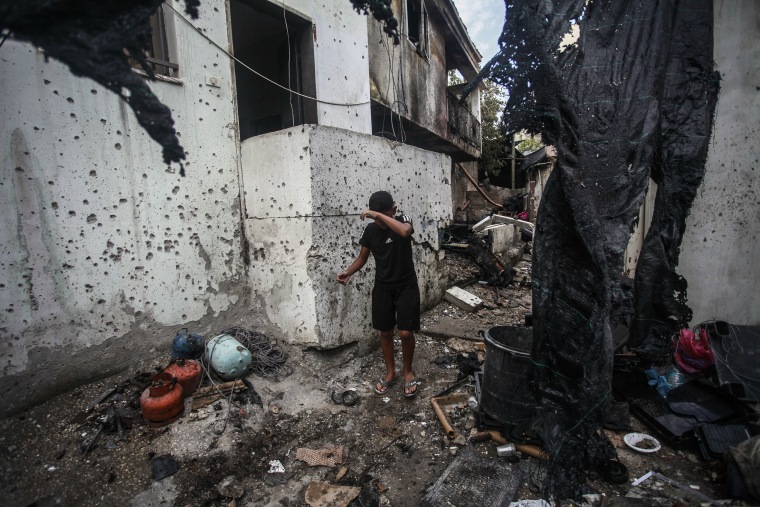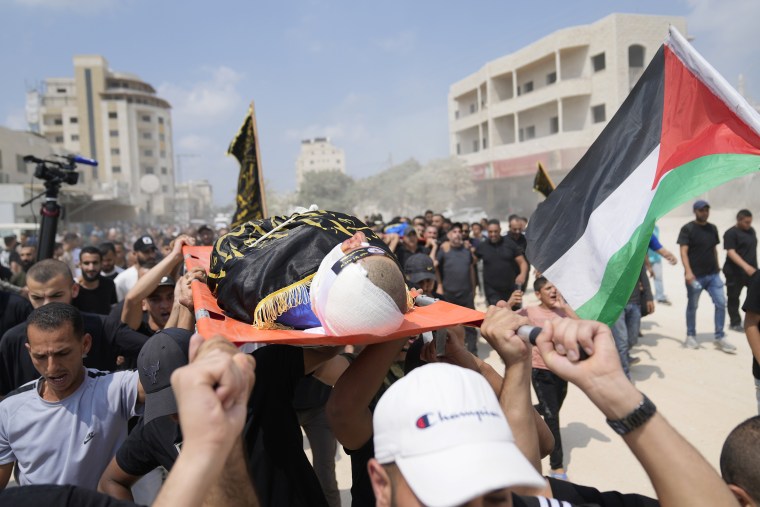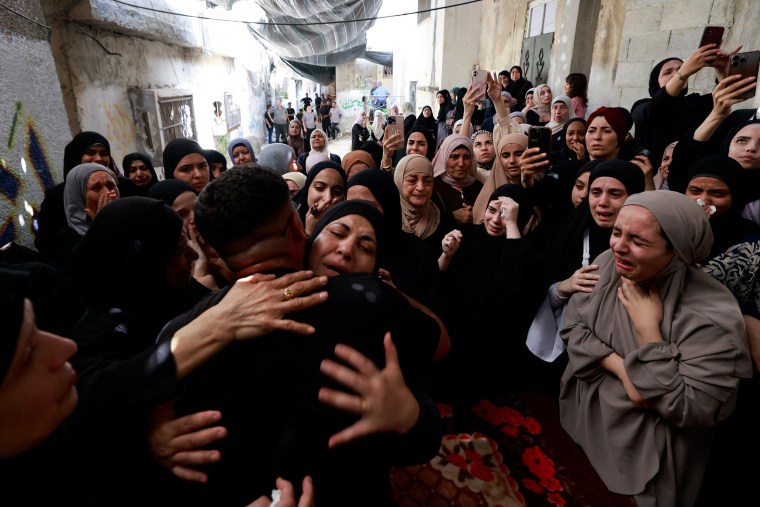JERUSALEM — Israeli forces launched a sweeping military operation Wednesday in the occupied West Bank, carrying out airstrikes and deadly raids and sealing off the city of Jenin.
Israeli Foreign Minister Israel Katz said the large-scale operation was part of a “full-fledged war” as he compared the situation to the Gaza Strip, saying Israeli forces must implement similar measures being carried out in the war-torn Palestinian enclave in the West Bank.
At least 10 people were killed and almost two dozen were injured, according to the Palestine Red Crescent Society, an emergency service.
Israel has conducted near-daily raids in the West Bank, which Israel has occupied since 1967, in the months since Hamas' Oct. 7 attack and the subsequent Israeli offensive in Gaza. But Wednesday's operation could be the largest in more than 20 years, when what Israeli officials called Operation Defensive Shield was executed during the Second Intifada, or Palestinian uprising.
The Israel Defense Forces, the Israel Security Agency (also known as the Shin Bet) and the Israel Police said in a joint statement that forces had launched a “counterterrorism operation” in Jenin, Tulkarem and Al-Faraa refugee camp overnight, “eliminating armed terrorists from the air and ground.”
They said three armed militants “who posed a threat” to security forces were killed in an airstrike in the area of Jenin, while two other armed militants were killed in Jenin and Tulkarem, which are about 30 miles apart. Israeli authorities said a number of “wanted suspects” were also apprehended, along with a number of weapons.
Israeli forces “exposed and dismantled explosives that were planted under the roads in the area and were intended to be detonated in attacks against the security forces operating in the area,” the statement said.
Images and videos shared on social media and verified by NBC News showed Israeli bulldozers appearing to destroy roads in Tulkarem and Jenin overnight.

Israeli authorities said their forces also launched air raids in the area of Al-Faraa refugee camp, just over 15 miles south of Jenin, in which Israeli authorities said four other armed militants were killed.
Kamal Abu al-Rub, the governor of Jenin, said on Palestinian radio that Israeli forces had surrounded the area and blocked off exit and entry points, as well as access to hospitals, The Associated Press reported. The staff at the hospital was later allowed to move freely after having faced "severe restrictions" by Israeli forces, according to Medical Aid for Palestinians.
Palestinian Prime Minister Mohammad Mustafa’s office said in a statement that any incursion into hospitals was “a direct threat to the lives of patients and medical staff.” Israeli forces had blocked entry roads and besieged multiple medical facilities across the West Bank, the statement added.
Israeli forces raided homes in the the Nur Shams camp in Tulkarem, searching from one house to another and detaining men found inside, according to Nihad Al-Shawish, the head of services at the camp. Some have been released, but there is no information about the whereabouts of others, Al-Shawish said.
All access roads to the camp have been destroyed, Al-Shawish said.
Al-Shawish said hours before the raids began the camp was warned that civilians should consider evacuating the area by the Palestinian Authority's liaison with Israel. The evacuations were not mandatory, he said.
Israel’s operation in the West Bank — one of two Palestinian territories occupied by the Israeli government — still raised fears of forcible displacement among Palestinians.
Youssef Barahmi told NBC News he could see the camp being “surrounded by the IDF,” from his home less than 2 miles away in the town of the same name.
The Palestinian Authority employee said his mother-in-law, who lives in the camp, had told him that Israeli forces were surrounding her house. He added that he was no longer able to reach her over the phone.
Mutaz Abu Sanad, a businessman who lives at a camp in Tubas, said he worries the operation could last several days as Israeli forces search every home.
The situation at the camp “is extremely difficult,” Sanad said. People fear moving around trying to leave as the search-and-arrest raids continue.
'Full-fledged war'
Katz made the connection between the raids in the West Bank and the war in Gaza. Palestinian health authorities say more than 40,000 people have been killed in the besieged enclave since Israel launched its offensive after the Oct. 7 terrorist attacks. Hamas’ assaults in southern Israel killed 1,200 people and led to 250 others being taken hostage.
Katz said Israel must “address this threat in the same manner as we deal with terrorist infrastructures in Gaza, including the temporary evacuation of Palestinian residents and any other necessary measures.”
This is a “full-fledged war and we must win it,” he added.
Katz also said that the IDF was “operating with intensity” in Jenin and Tulkarem to stamp out “Islamic-Iranian terrorist infrastructures.”
Katz said that Iran was trying to establish "an eastern terrorist front" against Israel in the West Bank, and accused it of funding and arming militants and smuggling weapons from Jordan.
Israel frequently blames Iran for violence in the region. Tehran does not officially recognize Israel's right to exist and has supported militant groups throughout the region, including Hamas and Lebanon's Hezbollah. The U.S. government has designated Iran one of the world's leading state sponsors of terrorism.

Israel’s policies in the West Bank have drawn harsh international condemnation.
The International Court of Justice said last month that Israel’s occupation of Palestinian territories, including the West Bank, breached international law. The United Nations Office for the Coordination of Humanitarian Affairs has identified more than 1,000 attacks by Israeli settlers on Palestinians in the West Bank since Israel started its military offensive more than 10 months ago.
The sharp rise in settler violence has fueled an armed resistance in Jenin and elsewhere across the West Bank.
Kenneth Roth, the former executive director of Human Rights Watch, said that Israel, during it’s “endless occupation” of the occupied West Bank, should normally “apply law enforcement standards, which permit the use of lethal force only as a last resort to stop an imminent lethal threat.”
But “if the conflict with militants becomes intense and organized enough, Israel can apply war standards, which permits the killing of combatants (while taking all feasible precautions to spare civilians),” he said.
“The line between the two can be difficult to draw. It depends on the intensity and organization of the militants who are challenging Israeli forces,” he added.
The raids came amid growing tensions in the region amid Israel's monthslong military offensive in Gaza, with Iran having yet to act after vowing retaliation against Israel for the assassination last month of Hamas political leader Ismail Haniyeh.
The operation in the West Bank happened two weeks after the U.S. approved $20 billion in arms sales to Israel, including scores of fighter jets and advanced air-to-air missiles, according to a State Department announcement.

Hostilities also flared at Israel’s northern border with Lebanon over the weekend as Israeli forces and the Iran-backed militant group Hezbollah traded fire following the assassination of commander Fuad Shukr, for which Hezbollah also vowed retaliation.
Efforts to negotiate a cease-fire deal that would end the fighting in Gaza and free the hostages who remain held there have so far failed to yield results, despite recent optimism from Washington on progress in the talks.
Daniele Hamamdjian reported from Jerusalem, Omer Bekin from Tel Aviv, Chantal Da Silva from London and Daniel Arkin from New York.

